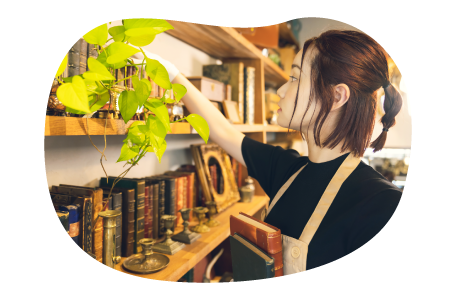
Why do antique stores need insurance?
When you have a shop filled with valuable antiques, insurance is a must. Business insurance can help pay for repair costs if a display is knocked over, or medical bills if a customer trips over a piece of antique furniture. It can also cover theft, fires, data breaches, and auto accidents.

Find affordable insurance
With Insureon, antique shop owners can compare quotes from top-rated insurance carriers to find affordable options.
A licensed insurance agent will help make sure you get the right coverage for your small business.
What types of insurance do antique stores need?
These insurance policies cover the most common risks at antique shops.
Business owner's policy
A business owner's policy, or BOP, is a cost-effective way for antique store owners to buy general liability coverage and commercial property insurance together.
- Customer bodily injuries
- Damaged or stolen antiques
- Business interruption insurance
General liability insurance
General liability insurance covers common third-party risks, such as a customer who trips on an uneven step in your antique store and files a lawsuit over their injury.
- Customer slip-and-fall accidents
- Damaged customer property
- Product liability insurance
Workers’ compensation insurance
Most states require workers' comp for antique businesses that have employees. It also protects sole proprietors from work injury costs that health insurance might deny.
- Employee medical expenses
- Disability benefits
- Legal costs from workplace injuries
Cyber insurance
This policy helps antique stores recover financially from data breaches and cyberattacks. It's recommended for any business that handles personal information.
- Customer notification expenses
- Fraud monitoring services
- Cyberextortion demands
Commercial umbrella insurance
Commercial umbrella insurance boosts coverage on your antique shop's general liability, employer’s liability, or commercial auto insurance once the policy limit is reached.
- Bodily injury lawsuits
- Property damage lawsuits
- Auto accident lawsuits
Commercial auto insurance
This policy covers accidents involving a vehicle owned by your antique store. Each state has its own requirements for auto liability insurance.
- Damage to another vehicle
- Injuries caused to another person
- Vehicle theft and vandalism
How much does business insurance cost for retail stores?

A small antique shop with only a few employees won't have to pay a lot for business insurance.
Factors that affect your antique shop insurance cost include:
- Products offered, such as furniture, frames, home decor, or collectibles
- Services you offer, such as delivery
- Business property and equipment
- Business income
- Business location
- Types of coverage purchased
- Policy limits and deductibles
How do I get business insurance for antique stores?
It's easy to get business insurance for your antique store if you have your shop's information on hand. Our application will ask for basic facts about your business, such as revenue and number of employees.
You can buy a policy online and get a certificate of insurance with Insureon in three easy steps:
- Complete a free online application.
- Compare insurance quotes and choose policies.
- Pay for your policy and download a certificate.
Insureon's licensed insurance agents work with top-rated U.S. providers to find the right insurance coverage for shops that sell antiques, vintage items, and collectibles, whether you work independently or hire employees.
Verified business insurance reviews
Hear from customers like you who purchased small business insurance.
FAQs about antique store insurance
Review answers to frequently asked questions about antique shop insurance.
Do antique shops need product liability insurance?
Yes, your antique store needs product liability insurance. If a customer is injured by a product, or if your product damages their property, you could be held liable. That could mean thousands of dollars in legal fees and medical expenses.
Product liability coverage is usually included in your general liability insurance. Every business in the supply chain should carry this coverage. That includes:
Though an antique shop is less likely to offer defective products, an antique could still cause harm. For instance, a vintage chair could break when a customer sits in it, or an oil lamp could leak and cause a fire in a customer's home.
It's also important to reduce your product liability risks to avoid these types of claims. Examine your items carefully to make sure there aren't any defects. Claims are costly—and they can also make your insurance rates go up.
Does antique store insurance protect against theft?
Protection against theft is a must-have when you deal in antiques. Commercial property insurance, included in a business owner's policy, covers costs in the event of shoplifting or an after-hours burglary at your shop.
To guard against dishonest employees, you might consider commercial crime insurance. This policy will cover costs if an employee forges your signature or makes off with a valuable item. You can typically add it to your property policy or BOP.
Security systems and cameras can go a long way toward preventing theft. They can also reduce your premium, but you'll have to check with your insurance company to see which security measures qualify you for a discount.
What other insurance policies should antique stores carry?
Antique dealers should consider the following types of coverage, in addition to those mentioned above:
- Business income insurance helps cover rent, lost profits, and day-to-day expenses when your antique store is forced to close because of damage from a fire, storm, or other covered property claim. It's also called business interruption insurance.
- Equipment breakdown insurance covers equipment that fails unexpectedly, such as a sudden malfunction of your point of sale devices.
- Inland marine insurance is a type of property insurance for items in transit or kept at a storage locker or other off-site location. If customers consign items to you, then you may also need bailee coverage.
- Professional liability insurance helps pay for legal costs from professional negligence, such as an accusation that your appraisal of an antique collection was inaccurate. It's also called errors and omissions insurance (E&O).
- Electronic data processing insurance protects against financial losses related to data loss on computers, backup drives, and other electronic devices.
If you have questions or need help finding the right coverage options for your risks, chat with a licensed agent.
